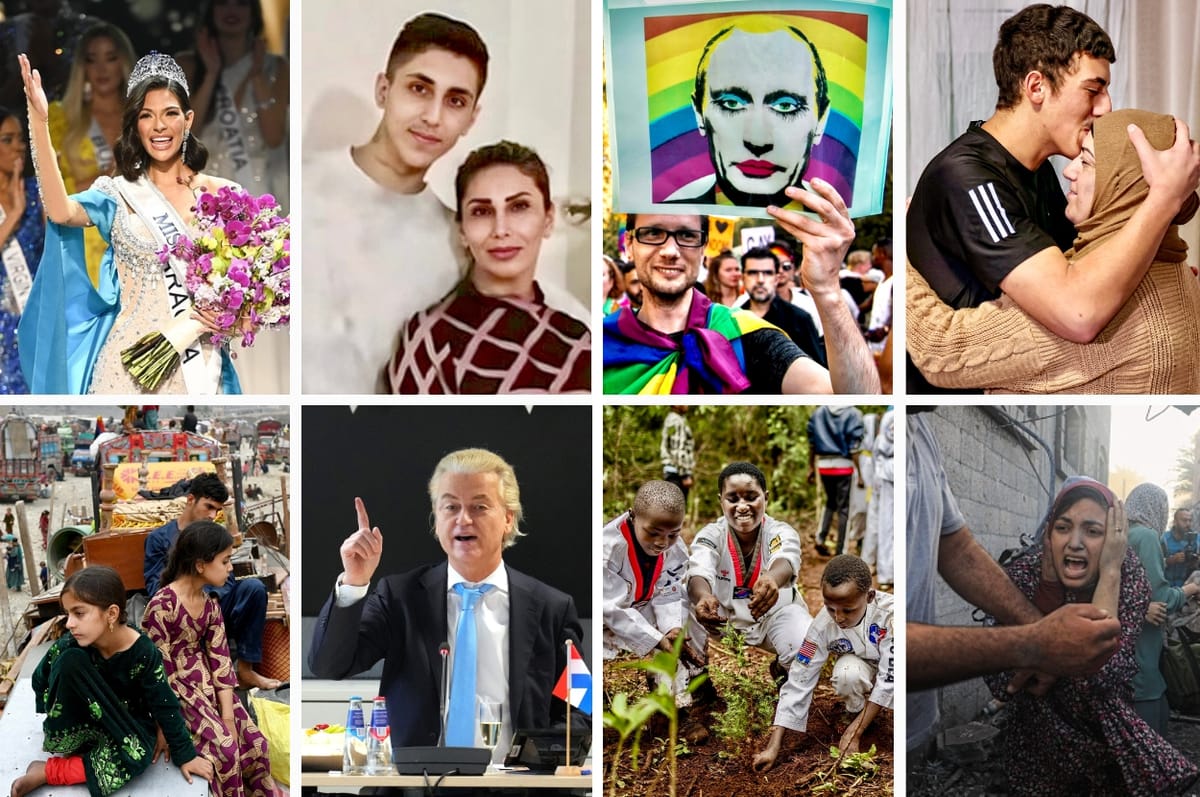Here’s What Happened Around The World In November 2023
Take a look back at some of the biggest stories that you may have missed in November 2023.

Take a look back at some of the biggest stories that you may have missed in November 2023.
1. The war between Israel and Hamas raged on.
The war in Gaza raged on, but Israel and Hamas agreed to a seven-day ceasefire that finally allowed much-needed humanitarian aid to enter the Gaza Strip.
70 Israeli hostages and 240 Palestinian women and children held in Israeli prisons were freed as part of the deal and reunited with their families.
More than 15,000 Palestinians, including more than 6,000 children, have been killed in Gaza since Oct. 7, while the death toll in Israel stands at 1,200.
2. Pakistan is starting to arrest and mass deport thousands of Afghan refugees back to the Taliban-controlled Afghanistan
Pakistan is starting to arrest and mass deport thousands of Afghan refugees back to the Taliban-controlled Afghanistan.
In October 2023, the Pakistani government told undocumented foreigners to leave the country by Nov. 1 or face arrest and deportation.
There are about four million Afghan migrants and refugees in Pakistan, and about 1.7 million of them are undocumented.
At least 600,000 of them fled to Pakistan after the Taliban’s takeover in 2021, according to the UN, while many others have lived in Pakistan for decades.
Pakistan’s government said the move was due to security reasons and not aimed at Afghans, even though Afghans make up the majority of migrants and refugees in the country.
It said that Afghans who are registered as refugees would not be targeted, but rights groups say there have still been incidents of this happening.
Since the announcement, at least 250,000 Afghans have already left Pakistan.
On Nov. 1, security forces started launching raids to arrest and deport undocumented foreigners.
The crackdown has been widely criticized by human right groups, who say that minorities such as girls, women and journalists, face high risks if they return back to the Taliban-ruled Afghanistan.
Since taking power of Afghanistan’s government, the Taliban has increasingly restricted women’s rights, including banning girls from going to high school and university.
The influx of refugees is also putting pressure on Afghanistan, which is already struggling due to international sanctions and foreign aid cuts against the Taliban.
3. Miss Nicaragua won Miss Universe and unexpectedly became a symbol of resistance
Miss Nicaragua won Miss Universe for the first time and it unexpectedly became a symbol of resistance.
On Saturday, November 18, 23-year-old Sheynnis Palacios became the first Nicaraguan to win the Miss Universe title.
She won the beauty pageant in a dress inspired by the Nicaraguan flag, which depicts blue and white stripes and the country’s coat of arms at the center.
Her victory was celebrated throughout the country and led people to take to the streets waving the Nicaragua flag.
But actually, raising the Nicaraguan flag is seen as a symbol of resistance in the country and has not been done en masse in a long time.
That’s because the country has been ruled by president Daniel Ortega for the past 17 years, turning the country into a dictatorship.
Under his rule, the government has cracked down on independent news outlets and suppressed political opposition, according to human rights groups.
Activists are calling Palacios’ win “a beacon of unity and hope”, as she comes from a low-income background like many in the country.
Following her win, the Nicaragua government allegedly tried to prevent Palacios’ from boarding a plane back to Nicaragua.
The order was later lifted, according to a Nicaraguan journalist, and the government issued an official statement congratulating Palacios on November 19.
Palacios has not voiced a political opinion about the Nicaraguan government.
She dedicated her win to “all the girls around the world, her inner child, her family, and her country’s more than 6 million people.”
4. This Nepalese nursing student has become the first plus-size woman to participate in the Miss Universe pageant
Nepalese nursing student, Jane Dipika Garett, has become the first plus-size woman to participate at the Miss Universe pageant.
The 23-year-old from Nepal’s capital Kathmandu took home the crown of Miss Nepal in September and will represent her country at the Miss Universe pageant in El Salvador on Saturday Nov. 18.
She is an advocate for mental health and body positivity, saying that all women deserve to be represented in the fashion and beauty industry.
She also speaks openly about having polycystic ovary syndrome, or PCOS, a condition that causes hormone imbalance and irregular periods.
This year’s Miss Universe is one of the most diverse ever, with two trans women, two mothers, and a Miss Universe contestant from Pakistan, also competing for the first time.
5. Argentina elected this far-right leader known as “The Madman” as its new president
Argentina has elected a far-right politician as its new president.
On Sunday, Nov. 19, far-right candidate Javier Milei won the election with at least 56% of the votes, while his opponent, economy minister Sergio Massa received 44%.
Nicknamed “El Loco” – the madman – Milei has been called a “more excessive and unstable” version of former US president Donald Trump and far-right former Brazilian president Jair Bolsonaro.
Milei ran on a “chainsaw plan”, which would close the ministries of culture, women, education and others to reduce government spending.
Milei is anti-abortion, raising fears that he could reverse the country’s abortion laws after it finally became the biggest country in Latin America to legalize abortion in 2020 after a long push by activists.
He has called climate change “a socialist hoax” and is pushing for looser gun laws.
Milei has promised to fix inflation by adopting the US dollar as the country’s official currency and abolishing the central bank.
Argentinians who voted for Milei said they wanted to see change after years of living under the world’s highest inflation rates and increasing poverty.
However, rights groups and minorities are concerned his election could reverse human rights progresses that the country has made in recent years.
6. In a huge upset, the far-right “Dutch Donald Trump” won the Netherlands’ election
In one of the biggest upsets in Dutch politics, this far-right politician who has been called the “Dutch Donald Trump” has won the the Netherlands’ election.
60-year-old Geert Wilders’ far-right Party for Freedom unexpectedly won the most votes in the general election on Wednesday Nov. 22.
Wilders, who founded the party in 2006, is against Islam, immigration and the European Union.
He ran on a campaign of removing Islamic schools, Qurans and mosques, stopping all refugees and migrants from entering the Netherlands, and holding a referendum for the country to leave the EU.
But in the lead up to the election, he has softened his language around his anti-Islam beliefs, saying he would not breach Dutch laws and the constitution that protects the right to freedom of religion and expression.
Due to his controversial views, Wilders has had to be protected at all times by police since 2004.
Wilders has rejected being labeled as far-right, saying he is just “speaking up for ordinary people”.
Instead, Wilders’ victory seems to have been based on his campaign to curb migration and tackle the cost-of-living crisis and housing shortages – key issues for Dutch people, according to AP.
His election comes as a shock to the Netherlands, which has widely been regarded as one of Europe’s most socially liberal countries.
Having won 37 out of 150 seat government, Wilders must now form a coalition in order to rule. If he succeeds, he will become the first far-right prime minister of the Netherlands.
7. Russia banned the entire global LGBTQ movement as an “extremist” organization
Russia has banned the entire global LGBTQ movement as an “extremist” organization.
The country’s justice ministry had filed a lawsuit accusing the undefined “international public LGBTQ movement” of “inciting social and religious discord”.
And on Thursday Nov. 30, the supreme court ruled in a closed-door hearing that LGBTQ activists should all be labeled as extremists.
The ruling essentially outlaws any public activities and symbols related to LGBTQ rights and activism.
Under the new law, LGBTQ activists, organizers and donors could face up to 10 years in prison, according to rights groups.
The ruling is the latest crackdown on the LGBTQ community under president Vladimir Putin.
Rights groups have condemned the latest verdict, saying it violates the right to freedom of expression and will affect countless people.
8. New Zealand’s new right-wing government reversed its groundbreaking smoking ban to pay for tax cuts
New Zealand’s new right-wing government has reversed its groundbreaking plan to ban smoking for future generations to help pay for tax cuts.
In November 2022, New Zealand became the first country in the world to pass a new law making it illegal for anyone born after Jan. 1, 2009, to ever buy tobacco, including cigarettes.
It also prohibited tobacco products from being sold at supermarkets and corner shops, making them only available in specialty tobacco stores.
The law, which was due to be implemented in July 2024, was part of former prime minister Jacinda Ardern’s government’s plan to make New Zealand smokefree by 2025.
But on Saturday Nov. 25, the newly elected right-wing government announced that it was scrapping the law and using the revenue from cigarette sales to pay for its tax cuts.
New prime minister Christopher Luxon – whose party won the election on a campaign of cutting taxes – said that the reversal would stop a black market from emerging.
The shock reversal was widely criticized by health experts, who say it is a huge win for the tobacco industry at the expense of public health.
The law, which had widespread public support, would have saved the country’s health system US$800 million over the next 20 years and lowered mortality rates by 22% for women and 9% for men.
Luxon has said that his government is still dedicated to lowering smoking rates but will do so through through education and other policies.
9. This croatian politician tried to kiss a German woman politician at an EU summit and caused a controversy
Croatia’s foreign minister, Gordan Grlić-Radman, has been caught in a controversy after he tried to kiss a German woman colleague on the cheek at a European Union summit in Berlin, Germany.
In the video of the moment, Grlić-Radman is seen shaking hands with German Foreign Minister Annalena Baerbock and attempting to kissing her as she walks over and takes center stage for the EU minister group photo on Thursday Nov. 2.
Baerbock appears to present her cheek but moves it swiftly the other way.
The incident drew criticism among German and Croatian newspapers, which called it sexual harassment.
“We ministers always greet each other cordially. If someone saw something bad in that, then apologies to whoever took it that way,” Grlić-Radman told a Croatian newspaper.
“Maybe it was an awkward moment,” he added.
10. Somalia was hit by its worst flood in 100 years, right after its worst drought in 40 years
Flash floods in Somalia have left almost 100 people dead and more than 700,000 people displaced in what the United Nations has called a “once-in-a-century event”.
Somalia has been lashed with heavy rains since October, which struck right after the country suffered from its worst drought in four decades.
Officials said that central and southern Somalia have already received more rain in the first week of November 2023 than a typical Deyr season – the rainy season – which typically lasts from October to December.
The floods, linked to El Niño, have also inundated nearby countries in eastern Africa, including Ethiopia and Kenya nearby, where at least 46 people were killed, Reuters reported.
The UN said the number of people displaced by the floods in Somalia has “nearly doubled in one week” and many people have been left without shelter, water and food supplies.
The Somali government has declared a national state of emergency, and the country’s Prime Minister Hamza Abdi Barre has called on the international community for help.
11. Iran jailed this mom for 13 years for speaking out about security forces killing her son
Iran has jailed this mom for 13 years for speaking out about security forces killing her son.
Mahsa Yazdani’s 20-year-old son was killed in September 2022 at a protest against the death of Mahsa Amini.
A medical report found that her son, Mohammad Javad Zahedi, died after he was shot several times at close range in the back and head by shotgun pellets.
After his death, Yazdani publicly called for justice for her son and condemned the Iranian government’s brutal crackdown on protesters.
She was arrested in August 2023 and charged with “blasphemy, incitement, insulting the supreme leader and spreading anti-regime propaganda”.
Yazdani was found guilty and sentenced to 13 years in prison on Friday Nov. 3, without the possibility of parole in the first five years.
12. Kenya created a public holiday for people to plant 100 million trees to fight climate change
Kenya’s government created a special public holiday on Monday Nov. 13 for people across the country to plant 100 million trees to help fight climate change.
Kenya’s President William Ruto said that the country has set a goal of planting 15 billion trees by 2032 and will start by planting 100 million trees this year.
Kenya’s Interior Minister announced the holiday a week earlier on X, formerly known as Twitter, writing, “The country shall be expected to plant trees as a patriotic contribution to the national efforts to save our country from the devastating effects of climate change.”
The government provided 150 million seedlings for free on Monday to be planted in designated public areas.
Kenyans were encouraged to plant a minimum of two seedlings each, to meet the aim of 100 million trees.
Kenya’s forest cover decreased from 12% to 6% between 1990 and 2010, according to the United Nations Food and Agriculture Organization (FAO).
The government has set aside more than $80 million this year to restore the forest coverage to more than 10%, according to the Guardian.





